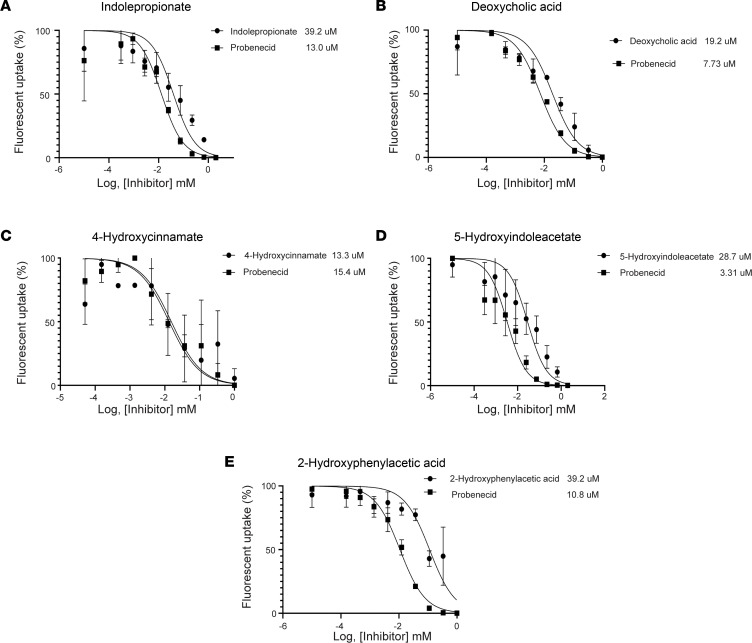Human Transporter 0AT1 Fluorescence-based Antagonist Assay Service
Unlocking Insights into OAT1 Functionality: Precision in Antagonist Assays
Creative Biolabs provides comprehensive In Vitro ADME for cancer immunotherapy, which includes In Vitro ADME Screening Service, High-Throughput ADME Service, Drug Metabolic Stability Analysis Service, Drug Distribution Analysis Service, Protein Binding Analysis Service, Drug-Drug Interaction Analysis Services, Kinetic Solubility Testing Service, and Thermodynamic Solubility Testing Service.
Human organic anion transporter 1 (OAT1) is a crucial protein involved in the renal excretion of a wide variety of endogenous and exogenous organic anions. OAT1 is known for its broad substrate specificity, handling compounds ranging from antiviral drugs and antibiotics to anti-inflammatory and anticancer agents. The functional characterization of OAT1 is vital for understanding drug-drug interactions, predicting potential nephrotoxicity, and optimizing drug dosing regimens. Its activity can be inhibited or modulated by various compounds, making it a key target for drug development and safety assessment. Understanding the dynamics of OAT1 interactions provides invaluable insights into drug metabolism and disposition, aiding in the development of safer and more effective therapeutic strategies, especially in the context of cancer immunotherapy where precise drug transport and clearance are critical.
Human transporter OAT1 fluorescence-based antagonist assay service is one of the In Vitro ADME services we are delighted to introduce. This assay is designed to provide comprehensive insights into the interactions and inhibition of the OAT1 transporter, crucial for understanding drug pharmacokinetics and potential nephrotoxicity. Leveraging state-of-the-art technologies and rigorous methodologies, we ensure precise and reliable results that meet the highest standards of the pharmaceutical and biotechnology industries.
Our services include:
-
Functional assessment of OAT1 using CHO-K1 cell-based assays
-
Utilization of the fluorescent substrate 6-carboxyfluorescein (6-CF) for precise antagonist studies
-
Application of fluorimetry to detect changes in fluorescence intensity, using Calcein AM as a secondary substrate
Assay Information:
|
Substrate
|
Assay Type
|
Cell Type
|
Functional Mode
|
Detection Method
|
Measured Response
|
|
6-CF
|
Functional
|
CHO-K1
|
Antagonist
|
Fluorimetry
|
Fluorescence
|
Workflow
-
Cell Culture and Preparation:
-
Cultivation of CHO-K1 cells expressing OAT1 under optimized conditions
-
Assay Setup:
-
Seeding of cells into assay plates and ensuring cell adherence
-
Treatment with test compounds and 6-CF substrate to assess OAT1 interaction
-
Incubation and Treatment:
-
The incubation period to allow for interaction between test compounds and OAT1
-
Monitoring of substrate accumulation using fluorimetry and measurement of fluorescence intensity
-
Data Collection and Analysis:
-
Quantitative analysis of fluorescence data to determine OAT1 antagonism or modulation
-
Comprehensive data interpretation to evaluate drug interactions and efficacy
Published Data
In this study, it was demonstrated that gut-derived compounds significantly inhibit the transport of 6-CF in OAT1-expressing HEK293 cells. This inhibition underscores the pivotal role of OAT1 in mediating the interaction between gut microbiome-derived metabolites and host metabolism. The findings highlight the potential implications for drug interactions and metabolic regulation influenced by gut microbiota, providing crucial insights into the intricate interplay between renal transporters and microbial metabolites in human health and disease.
 Fig.1 OAT1 transport is inhibited by gut-derived compounds in vitro.1
Fig.1 OAT1 transport is inhibited by gut-derived compounds in vitro.1
Applications
-
Drug Interaction Studies: Evaluate how new drug candidates interact with OAT1, identifying potential inhibitors or substrates that could affect drug efficacy and safety.
-
Nephrotoxicity Assessment: Predict the nephrotoxic potential of compounds by assessing their interaction with OAT1, crucial for developing safer medications.
-
Pharmacokinetic Profiling: Determine the impact of OAT1 on the absorption, distribution, metabolism, and excretion (ADME) of drugs, aiding in the optimization of dosing regimens.
Advantages
-
High Sensitivity: The use of 6-CF provides a sensitive readout for detecting subtle changes in transporter activity, ensuring accurate identification of OAT1 interactions.
-
Specificity: The assay is specifically designed for OAT1, minimizing cross-reactivity and providing clear insights into OAT1-mediated transport processes.
-
Quantitative Analysis: Fluorimetry allows for precise quantitative measurements of fluorescence intensity, facilitating detailed analysis of transporter interactions and drug inhibition.
-
Robustness: Utilizing CHO-K1 cells expressing OAT1, the assay is optimized for consistency and reproducibility, providing reliable data for drug development projects.
-
Customizable Protocols: We offer tailored assay protocols to meet specific project needs, ensuring that the assay setup aligns with your research objectives and requirements.
For precise evaluation of OAT1 interactions crucial to advancing drug development, choose Creative Biolabs. Contact us today to explore how our specialized OAT1 fluorescence-based antagonist assay service can accelerate your research and development efforts.
Reference
-
Granados, Jeffry C., et al. "The kidney drug transporter OAT1 regulates gut microbiome–dependent host metabolism." JCI insight 8.2 (2023).
For Research Use Only | Not For Clinical Use


 Fig.1 OAT1 transport is inhibited by gut-derived compounds in vitro.1
Fig.1 OAT1 transport is inhibited by gut-derived compounds in vitro.1
 Download our brochure
Download our brochure